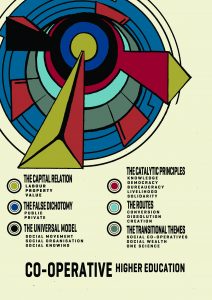Practical support
If you want to start a co-operative in the UK, there are local Co-operative Development Agencies, co-operative consultancies, and Co-operatives UK. A co-operative university requires expertise from specialists both in co-operatives and in higher education. The Co-operative College is the leading organisation for co-operative education in England. There is also the Welsh Co-operative Centre and the Co-operative Education Trust Scotland.
Scholarship and research
The bibliography for co-operative higher education includes a growing list of publications as well as links to existing higher education co-operatives and key publications on co-operative schools.
The UK Society for Co-operative Studies (UKSCS) is the scholarly society for co-operative research in the UK and publishes a peer-reviewed journal three times a year, as well as holding a conference in the Autumn.
The International Co-operative Alliance (the worldwide movement’s co-ordinating body) hosts a Committee on Co-operative Research (CCR), which acts as ‘a bridge between academic research and the co-operative world.’
The CCR also maintains a directory of co-operative research centres around the world. Many are based in universities that run programmes of related study.
The Co-operative College (UK) hosts a research network for co-operative education with over 100 members.
A mailing list for co-operative higher education was set up in 2015 as part of a funded project and continues to be a way for people to inform and discuss related issues.
Cultivate.coop is a US-based library of information about co-operatives.
Co-operative leadership programmes
Research undertaken in 2014 at St Mary’s University, Canada, found 15 post-graduate programmes of Co-operative Business Education (CBE) in 10 countries. Such programmes typically include courses on co-operative leadership, governance and management. A key finding of the research was that “the areas of co-operative management practice where CBE graduates have the greatest impact are governance, strategic thinking and planning and member engagement”. The report compares the features of all of the CBE programmes and acknowledges that many more complementary programmes of study also exist outside of universities. Download the report.
Since the report, the International Co-operative Business Education Consortium (ICBEC) has been established.
In the UK, the Co-operative College and Manchester Metropolitan University jointly run an MA in Educational Leadership and Management aimed at co-operative school leaders.
